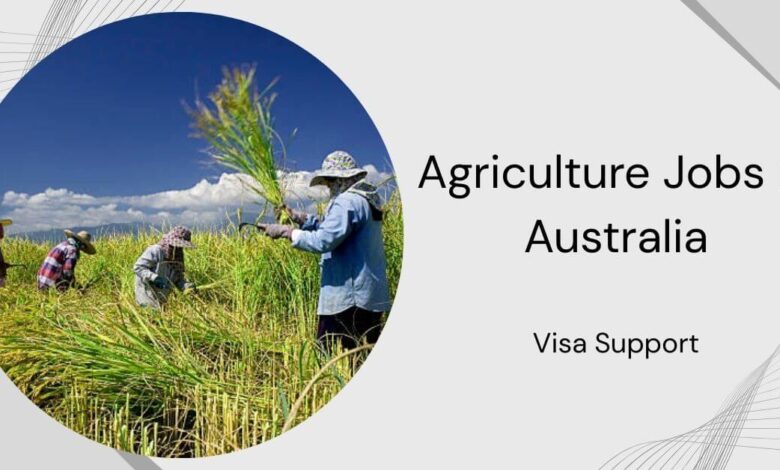Agriculture Jobs in Australia 2025 – with Visa Support

Agriculture jobs in Australia are a great choice for people who enjoy working outdoors and want to be part of one of the country’s most important industries. These roles often offer competitive salaries, with average earnings around $98,592 per year or $32.31 per hour, depending on skills, experience, and location.
Whether you’re new to farming or have years of agricultural experience, there are opportunities across crop production, livestock farming, machinery operation, and farm management. Most positions are physical, on-site jobs, though some roles like agribusiness planning or farm administration may allow for partial remote work. Agriculture careers in Australia are not just about hard work they’re about connecting with the land, contributing to food security, and enjoying a rewarding lifestyle with plenty of growth opportunities.
List of Agriculture Jobs in Australia:
The following is a comprehensive list of agricultural occupations that are available in Australia:
Crop Farming:
A plant that can be developed and collected for subsistence or benefit may be considered an edit. In other terms, a trim may be a plant or plant item that is specifically designed for a specific purpose, such as fuel, fiber, or nourishment.
Fruit Farming:
The fruit is the swollen or dry-aged ovary of a blossoming plant, which encases the seed or seeds. In this manner, apricots, bananas, grapes, bean cases, maize grains, tomatoes, cucumbers, and (in their shells) oak seeds and almonds are all considered fruits.
Horticulture:
Horticulture is the art and science of cultivating vegetation. The Latin words hortus, which refers to “plant,” and culture, which implies “to develop,” provide the historical foundation for this definition. The cultivation of vegetation is divided into various categories due to their diverse purposes.
Livestock Farming:
Pigs, sheep, goats, dairy animals, steeds, and poultry are all examples of animals that are raised for food and other purposes. Animal cultivation fosters these creatures for a variety of purposes, including transportation, sustenance, and clothing.
Poultry Farming:
Poultry farming is the process of breeding domesticated feathered animals, including chickens, ducks, turkeys, and geese, to provide meat or eggs for human consumption. Chickens are predominantly raised in large quantities. Annually, over 60 billion poultry are slaughtered for consumption.
Bee Farming:
The primary objective of bee producers is to operate profitable commercial enterprises that are founded on the management of nectar bee populations. Businesses in Australia undergo a transformation from part-time enterprises that provide an additional salary stream to large-scale operations that employ a dozen or more employees year-round.
Aquaponics:
Aquaponics is a food production system that combines aquaculture (the cultivation of aquatic organisms such as fish, crawfish, snails, or prawns in containers) with hydroponics (the cultivation of plants in water). The nutrient-rich aquaculture water is fed to hydroponically grown plants.
Energy Farming:
It is referred to as a solar-powered farm or solar-powered halt. It is dedicated to the construction of solar panels or photovoltaic systems that capture solar radiation and convert it into renewable electrical energy.
General Responsibilities:
Planned, prepared, and planted field crops, tabulated seeds, fertilizer, and herbicides, and supervised water frameworks.
- Maintain documentation, evaluate edit yields, filter soil dampness, and promote editor well-being.
- Maintain trellises, stakes, and other rural structures.
- Farmhands are to be prepared, supervised, and driven.
- Successfully establish gathering and capacity areas.
- Keep an eye out for garbage and fertilizer, and use fertilizer as fertilizer.
- Maintain meticulous records and count inventories.
- Maintain issue management.
- Ensure that all regulations are still being followed.
- Coordinates and supervises all farm-related activities, including the development of equipment.
- Manages the well-being and productivity of animals.
- Engage with vendors, clients, and other representatives of the development industry.
- Researches the most recent developments in rural areas and develops methodologies for the current era.
- Upholds the farm’s sanitary conditions.
- Utilize herbicides and fertilizers as required; plant, tend, and harvest crops; and assess and grade soil health and hydration.
- Operate and maintain agricultural equipment, including tractors, plows, and irrigation systems.
Check Also: General Laborer Jobs in Australia – Visa Sponsorship
Benefits of Jobs:
- High Demand: The agricultural, horticultural, and livestock sectors are in perpetual demand, which guarantees job availability.
- Competitive Wages: Provides equitable compensation, frequently accompanied by supplementary benefits such as performance bonuses and overtime.
- Visa Sponsorship Opportunities: A multitude of positions offer visa sponsorship for both skilled and unskilled workers, thereby facilitating legal employment.
- Diverse Positions: Opportunities encompass everything from the operation of machinery and farm administration to the picking and harvesting of fruit.
- Skill Development: Acquire practical skills in the administration of farms, machinery handling, and contemporary agricultural techniques.
- Permanent Residency Pathway: Employment in agriculture may qualify individuals for permanent residency in Australia.
- Cultural Exchange: Collaborate with individuals from a variety of origins to improve cross-cultural comprehension.
- Work-Life Balance: Certain positions offer flexible work arrangements, which provide an opportunity to discover the natural grandeur of Australia.
- Tax Benefits: The potential for tax advantages and deductions for laborers in remote or rural areas.
- Accommodation and refreshments: Numerous employers offer on-site housing and refreshments at reduced rates.
- Agricultural Sector Supportive Policies: The Australian government provides stability to the agricultural sector through initiatives and labor programs.
Salary:
Salary The average annual compensation for cultivation in Australia is $98,592 or $32.31 per hour. Entry-level positions commence at $81,338, while the majority of experienced specialists receive an annual salary of up to $141,500.
Conclusion:
In conclusion, crops consist of a variety of ingredients, including cereals, grains, and vegetables. The production of cereals is significantly influenced by wheat, which necessitates a wide spectrum of deliveries. The surrender of wheat in Australia has fluctuated by approximately two metric kilograms per hectare.
Frequently Asked Questions:
-
Is there a demand for agricultural employment in Australia?
The Australian agriculture sector’s stability is a result of the substantial demand for qualified professionals. The world requires sustainable production of agricultural products and foodstuffs, which is why this profession offers substantial job security.
-
Is it possible for me to immigrate to Australia and become a farmer?
The subclass 407 training visa includes farmer occupations on the skilled occupation list. Consequently, a farmer may be nominated for this visa if they have at least 12 months of full-time employment experience as a farmer within the two years prior to the submission of their application.
-
What are the procedures for obtaining employment in the agricultural sector of Australia?
A valid work visa is required to labor on a farm in Australia. The Work and Holiday visa (subclass 462) and the Working Holiday visa (subclass 417) are both popular choices for individuals who are in search of agricultural work opportunities. You can work and travel in Australia for up to 12 months under the Working Holiday visa.




